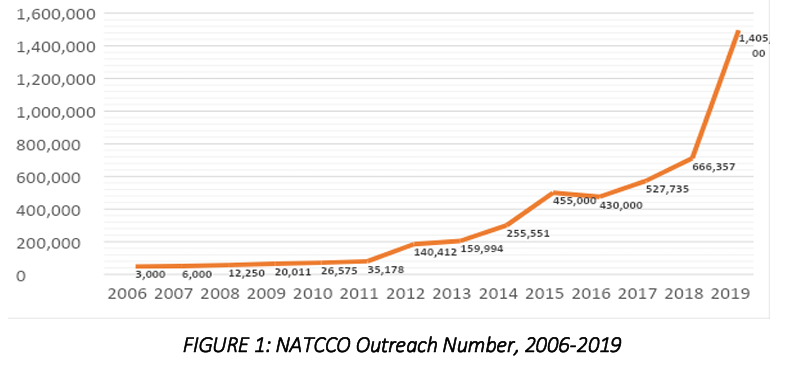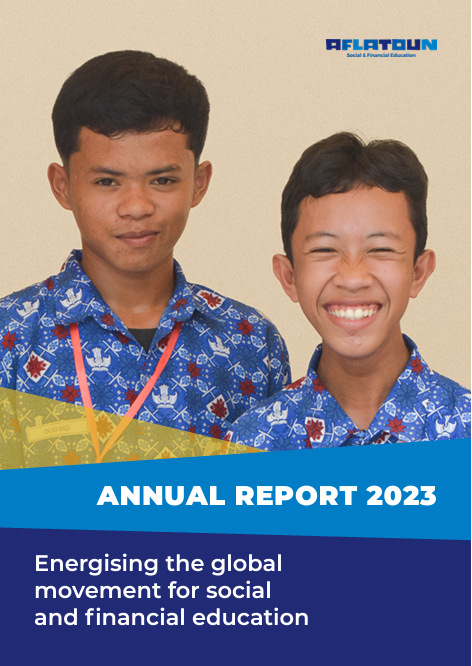The Case of NATCCO: From Scale-up to National Curriculum Integration
As one of the first partners of Aflatoun International, the success of the National Confederation of Cooperatives (NATCCO) in integrating Social and Financial Education into the national curriculum in The Philippines has many lessons for learning and replication. NATCCO’s succes can be viewed in the start-up, scale-up, and growth models and strategies.

NATCCO's Scale-up Model
NATCCO started implementing the Aflatoun programmes in 2006 with 3,000 children; in 2019, they reached almost 1.5 million children and youth in formal schools in the Philippines. This makes therefore a remarkable achievement of a scale-up model.

In NATCCO's scale-up model, we can see the start up, scale-up and growth stages:
From NATCCO’s experience, there are strategies that can be learnt and replicated:
Develop a specific task force or unit
Soon after NATCCO had been invited to be part of the pilot partners to implement the Aflatoun Programme, it appointed a lead person within their Education, Training, and Consultancy Team. The team later grew and even more young people joined to lead the Aflatoun Programme, so that eventually a new unit was formed to handle the implementation, the Children and Youth Unit.
Collaborate with government partners on teachers training programmes
When teachers' training started, NATCCO’s local co-op members provided small funding to support the three-day training while the Aflatoun trainers facilitated it. The local education office hosted the training.
Contextualised and translated curriculum into local languages
NATCCO translated the Aflatoun manual into four regional languages (Filipino, Hiligaynon, Cebuano, and Ilokano). This was done to help local co-ops and local education offices speed up the scale-up of the Aflatoun programme implementation.
Where are we now?
As of December 2019, the network of cooperatives that are engaged in the Aflatoun programmes’ implementation have grown to 157 (18.6% of the total coops members of NATCCO).
Social and Financial Education is being implemented in 1,654 partner schools, with a total of 1,405,900 children involved across the country. There are 8,229 teachers trained on the Aflatoun content.
Additionally, the total amount of savings reached in Aflatoun Clubs is over 260.3 million PhP.

What are the enabling factors in NATCCO's success?
-
The nature of NATCCO's organisation: Today, NATCCO is the biggest federation of co-ops in the Philippines in terms of geographica, reach, membership, financial capacity, and services offered. NATCCO delivers financial and non-financial services, with a major focus on education and training. Now, they aim to expand the Aflatoun reach to more local cooperatives and to collaborate with other organisations to continue the scale-up.
-
Mutual Benefits This contextualised Social and Financial Education programme stands out as a school-based programme that allows children from diverse socio-economic backgrounds to manage their own savings and learn about spending and budgeting among other topics. NATCCO’s partner-cooperatives, which manage the savings accounts, help the children save. For Aflatoun, this collaboration brings forth a model that proves that the curriculum works very well. Overall, the collaboration strengthens Aflatoun and NATCCO's advocacy at a national, regional, and global level.
-
Excellent relationship between cooperatives and government offices An example of this is the Lamac Multi-Purpose Cooperative (LMPC). LMPC’s Board Chairperson, who is a school principal, also heads the local education office in the area. There are many other cases of such excellent relationship that have brought a lot of success to the integration of the Aflatoun programme in different locations across the country.
-
The importance of the cooperative movement in the Philippines The cooperative movement has a special place in the Filipino community because it originated from the Catholic Church’s (predominant religion in the country) programme to empower the community and to tackle poverty. The co-op leaders believe that there is a strong calling for them to work towrds poverty alleviation and help the community to have better lives.
From scale-up to National Integration
The success of NATCCO’s scale-up model and strategy provided a solid foundation for the integration of Social and Financial Education into the national curriculum.
In 2015, Aflatoun International and NATCCO started a discussion with the Philippines’s Department of Education (DepEd) to integrate the SFE within the primary and secodary national educational curricula. That solid foundation was strengthened by the active engagement by Dr. Dina Ocampo, then Undersecretary of Curriculum of DepEd, in meetings with Aflatoun International.
After high-level discussions, a Memorandum of Agreement (MoA) among these entities was crafted under the leadership of Dr. Ocampo to support the integration of the SFE curriculum with the Basic Education Programme.
The MoA appoints NATCCO and Aflatoun International to provide technical assistance, resources, and network support for the implementation and integration of life skills education, financial literacy, and entrepreneurship.
Morevoer, they provide free access to teaching guides designed for kindergarten (ages 3-5), primary school (ages 6-14), and youths (ages 15 and above). The teaching guides are to be made available in four Filipino regional languages.
To further enhance teachers’ capability to convey quality education in financial literacy and entrepreneurship, training is necessary, while ensuring that content and pedagogy were aligned with the national Basic Education curriculum. Monitoring and evaluation framework and research technical support in evaluating the effectiveness of the activities are also to be provided.
The MoA also appoints the DepEd to issue policy guidelines and/or memoranda regarding the programme partnership on utilising the teaching guides within the existing national curriculum, and conducting multi-stakeholder planning meetings to converge all the actors in the financial education field.
The primary purpose of the directive will be to know “who is doing what and where” for harmony and synchronicity of the efforts, so that all the initiatives will move toward achieving the same goal. DepEd also checks and validates the congruency to the basic national curriculum; adapts teaching guides and materials (including printed and online resources) provided by Aflatoun that are deemed relevant and necessary for financial literacy and entrepreneurship in schools; and conducts monitoring and evaluation and reporting.
Upon the signing of the MoA, several workshops were completed to support the integration of the curriculum. In 2017, Aflatoun International shipped the full curriculum modules of AflaTot, AflaToun, and AflaTeen to NATCCO to be used to develop a curriculum workshop with the DepEd.
As of now, the DepEd has infused successfully the Aflatoun Financial Education lessons into some major subjects in the primary and secondary curriculua (i.e. kindergarten, Mathematics, Science, English, Filipino, etc.).
In partnership with:













